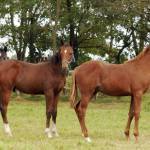Osteochondritis Dissecans Genetic Factors Probed

Osteochondritis dissecans (OCD) is a developmental orthopedic disease characterized by flaps, tears, and detached fragments in joint cartilage. The exact cause is not known, but it is likely that several factors including diet, genetics, and management can influence the risk of a particular horse being affected by the disease.
In a study with yearling Standardbreds, serum and saliva were tested for novel metabolic markers associated with OCD. Significant differences were seen in a group of horses that had been surgically treated for OCD two to nine months before the study as contrasted with unaffected yearlings from the same farm. Yearlings in this group had the same sires and similarly bred dams, and had been raised with the same nutrition and management plan as the OCD yearlings. Though plasma glucose and insulin levels have been correlated with the rate of OCD occurrence on some farms, there were no differences in plasma glucose or insulin levels between the two groups of yearlings.
The discovery that there are differences in a variety of metabolites in yearling Standardbreds that did develop OCD lesions versus full or half siblings that did not develop lesions may lead to ways to identify at-risk horses before lesions develop. It is not known whether these differences occur or can be detected in very young foals. If the differences can be detected early enough, it is possible that management strategies can be used to minimize the risk of OCD. Heavy foals that gain weight very quickly and foals eating grain meals that provoke large glycemic responses have been associated with a higher risk of OCD lesions, so careful nutritional management could possibly help to keep these foals free of orthopedic disease.








